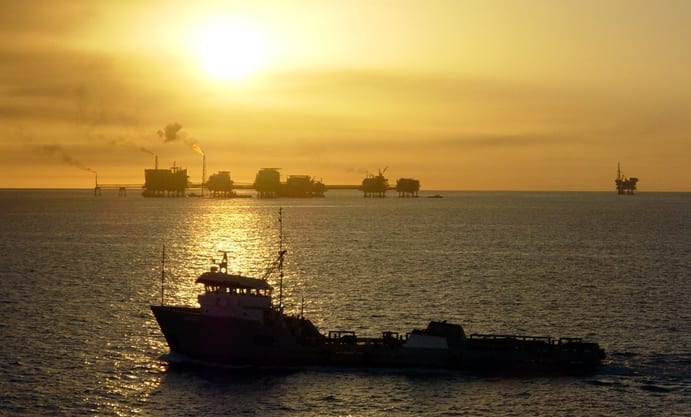This month’s Gulf Coast oil spill, Hurricane Harvey’s floodwater, and Midwestern farm fields may seem completely unrelated to each other, but they are. How?
When you live in a culture that lives and dies by the availability of oil, you know that sometimes, it’s going to blow up in your face. This month’s Gulf Coast oil spill is one of those times. The spill, reported by the Coast Guard on Saturday, October 14, is believed to be the largest in the United States since the Deepwater Horizon disaster in 2010.
Initial reports from LLOG Exploration Co. indicated that between October 11-12, a short connecting pipeline about 40 miles southeast of Venice, Louisiana, fractured, releasing 7,950 to 9,350 barrels of oil into the Gulf of Mexico. However, the Coast Guard later reported that LLOG upped its estimate of spilled oil to around 16,000 barrels. The affected pipeline is 5,000 feet beneath the water’s surface, which, according to the Coast Guard, means that the spilled oil will be broken down and dispersed by deep sea currents before it can reach the surface. However, as BP’s 2010 Gulf Coast oil spill and other similar incidents before and since have shown us, just because oil doesn’t surface doesn’t mean that it’s not damaging the sea floor or harming aquatic life. It just looks prettier without an oil slick on top of the water, and the impacts can be more easily hidden.
The damaged pipeline is now sealed and no more oil is leaking, just in time for yet another spill. Early Friday morning, October 20th, a barge exploded and leaked oil about three miles from Port Aransas, Texas. The fire took hours to extinguish. Two crew members went missing or died.
The recent Gulf Coast oil spill isn’t the only liquid oddity making its way through the water to our south. Remember Hurricane Harvey and the four days of rain that flooded Houston? Those 60 inches of torrential rain translated into twenty trillion gallons of fresh water with nowhere to go but into the Gulf. That much water, released in one vast blob, can’t easily or immediately mix with the heavier, salty ocean water of the Gulf of Mexico. The lighter floodwater rises to the top, blocking atmospheric oxygen from dissolving into denser saltwater below, potentially causing a dead zone. It can also change the type of phytoplankton that grow in the area, which affects the whole food chain. Scientists have gathered to study Harvey’s unprecedented fresh water pulse and its consequences for the Gulf ecosystem.
This is in addition to the New Jersey sized dead zone in the Gulf of Mexico that is caused by fertilizer runoff from Midwestern farms. Summer 2017 saw tremendous growth in the dead zone; at 8,776 square miles, it’s the largest yet recorded since monitoring began 32 years ago. Nitrate fertilizer, applied to farm fields in America’s heartland to compensate for played-out, eroded soil and thereby increase yields of corn, soy, and other agricultural commodities, washes off in heavy rains (along with more topsoil) and makes its way down the mighty Mississippi and out into the Gulf, where it fertilizes the algae. For the algae, it’s boom times as they experience artificially lush growth, but then it’s a bust as the sea water is emptied of oxygen. Fish and other sea life must move away or perish.
Incidentally, this toxic stew in the Gulf is all related. Increasing the food supply through what author Daniel Quinn calls “Totalitarian Agriculture” uses oil and creates the conditions for the human population to grow as well. A growing population demands not only more cheap food, but also more cheap oil. Both industries, Big Oil and Big Ag, increase carbon emissions into the atmosphere, which drives climate change. This causes more and bigger hurricanes, like Harvey, which damage infrastructure and send cascades of rainwater out to sea. Even “normal” torrents of rain are increasing in some places, dragging fertilizer and topsoil along for the ride. What’s the first thing we do after disasters like Harvey? Send in food aid, clean up, and rebuild (with more oil and industry, of course).
We humans are far better at creating systemic problems than we are in perceiving or figuring out how to fix them. The Gulf Coast oil spill is just one more episode of Business As Usual.
Daniel Quinn on Totalitarian Agriculture, posted by TSWabbit.
Related: Gulf Bends Over for Offshore Drilling


Join the conversation!